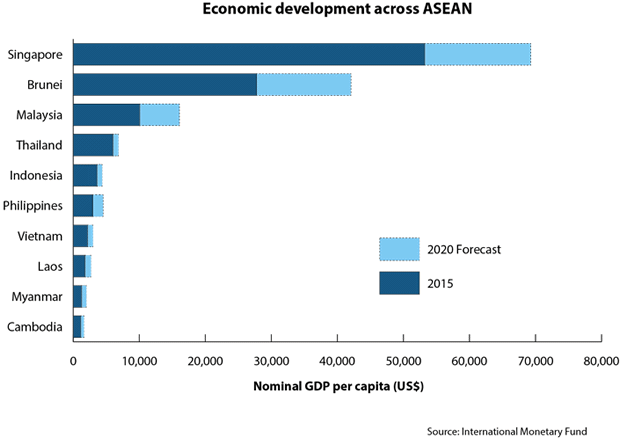
In May this year the Thai government piqued the international education sector’s curiosity by announcing legislation that would allow “high potential” foreign higher education institutions to set up campuses in Thailand. But as enthusiasm for branch campuses has waned globally in recent years, will the new policy opening in Thailand present an appealing opportunity? The answer largely depends on the details, which have yet to fully emerge.
Last month at a British Council organised event in London, Thailand’s Minister of Education presented a clearer view of how the regulatory framework may shape up. The first priority for the government is to attract foreign branch campuses to the Eastern Economic Corridor1 (EEC), a recently established special economic zone spanning the provinces of Chonburi, Rayong and Chachoengsao. All three are within a few hours’ drive of Bangkok and rank among the country’s five wealthiest provinces in terms of GDP per capita.
Prospective branch campuses are expected to offer courses that will support science and technology or the more specific subject areas that are listed in Thailand 4.0, which is a government initiative designed to propel the economy from middle- to high-income status.
“New engines of growth” under Thailand 4.0
| Existing industries to develop: | New industries to explore: |
|
|
At the same event, a representative from the Thailand Board of Investment highlighted incentives that will be available to universities setting up branch campuses in Thailand, including corporate income tax and import tariff exemptions. The Thailand Board of Investment is finalising details of these incentives and expects to officially announce the regulation by mid-November.
Analysis
The main driver for the new legislation is a lack of high-quality local higher education capacity. Large numbers of highly skilled employees are needed to accomplish the country’s goals under the Thailand 4.0 initiative, but no Thai universities appear in the top 500 of the most recent Times Higher Education world rankings and only two are included in the QS top 500. Introducing overseas HEIs is seen as a way to address this shortage.
Thailand’s attractiveness as a location for UK transnational education presents a mixed picture. On the plus side, the country remains a major recruitment market for UK institutions, with 6,635 students enrolled on UK HE courses in 2015/2016. It hosts a large and growing number of international schools, which could serve as feeder institutions for TNE programmes – over 44,000 students were enrolled in international schools in 2015, up by 35 per cent from four years earlier. Thailand also hosts around 12,000 international students according to UNESCO, mainly from nearby countries; the top student sources include China, Myanmar, Cambodia, Laos and Vietnam.
Yet Thailand may present a less obvious market opportunity for TNE than the sector has experienced elsewhere in the region. Though Thailand is ASEAN’s fourth wealthiest country in terms of GDP per capita (see chart below), it lags behind the group’s most developed economies. English language proficiency is much lower than the levels found in Singapore, Malaysia and the Philippines. Moreover, there are also potential issues with the supply of students. Thailand’s youth population is shrinking, creating excess capacity in domestic HE provision. And while it attracted around 4,900 students from across ASEAN in 2014, according to UNESCO, Thailand lacks clear pipelines for larger numbers of international students capable of paying TNE fee levels, in contrast to Malaysia with its global links to Muslim countries.

No UK universities currently have branch campuses in Thailand. However, joint or double degree programmes have so far been established by nearly 15 pairs of Thai and UK universities. “Progression degrees” which give students the option to transfer to a UK university for the final year or two years of their course have also become increasingly common in recent years, especially with private Thai universities. The curriculum for a new programme must be approved by Thailand’s University Council and the Ministry of Education in a relatively straightforward process that can usually be wrapped up in one year. The advantages of a branch campus in comparison to the existing TNE arrangements will largely depend on the incentive package that the government puts on the table.
In summary, this is a “wait and see” opportunity. But fortunately the wait probably won’t be long. The prime minister is using the special powers granted to him in the interim constitution to skirt the usual legislative hurdles and we expect much of the regulatory framework to be clarified by the end of 2017. In the meantime, if you have any questions regarding opportunities in Thailand, please contact Uraiwan Samolee on the Thailand team, or Matt Durnin on the consultancy team.
1 following the feedback from the London event, the Thailand Board of Investment announced that branch campus can be set up in other areas out of the EEC given that it is approved by the Foreign Higher Education Institutions with High Potential Development Board.

Add new comment
Please note that comments by non-members are moderated. They do not appear on the site until they have been approved. Comments by registered members appear here immediately. Your email address will not be published. All fields are required.